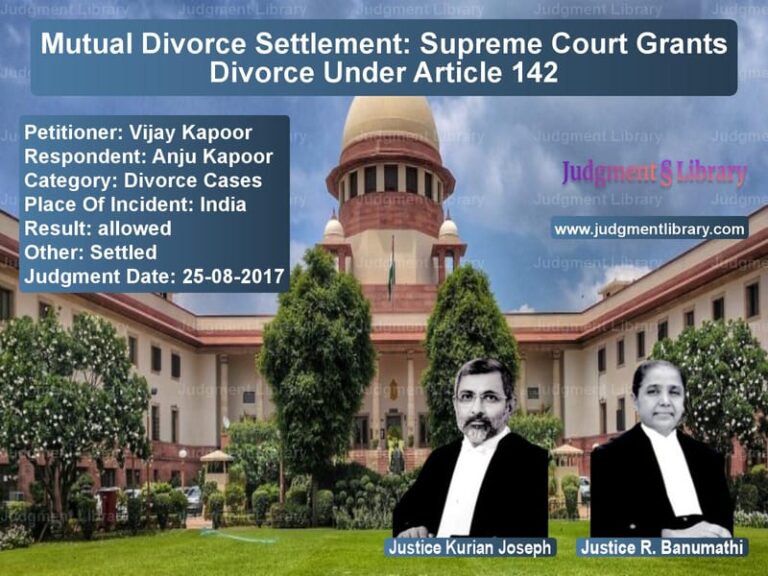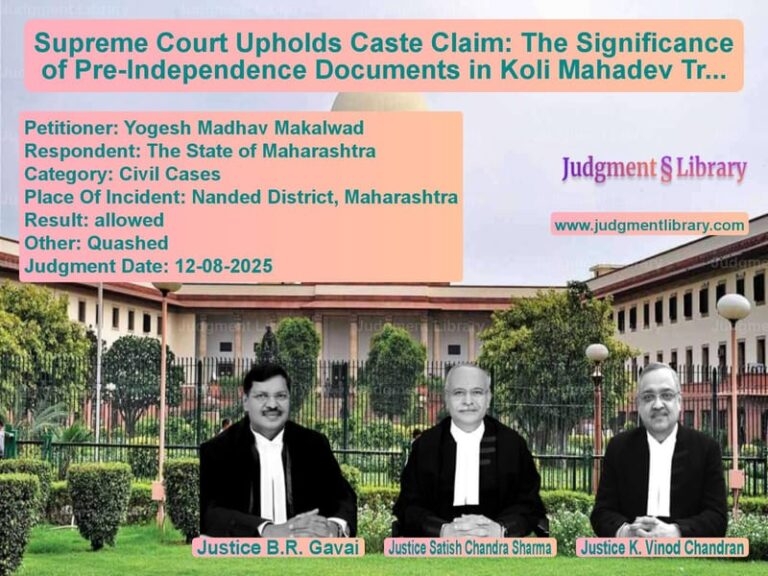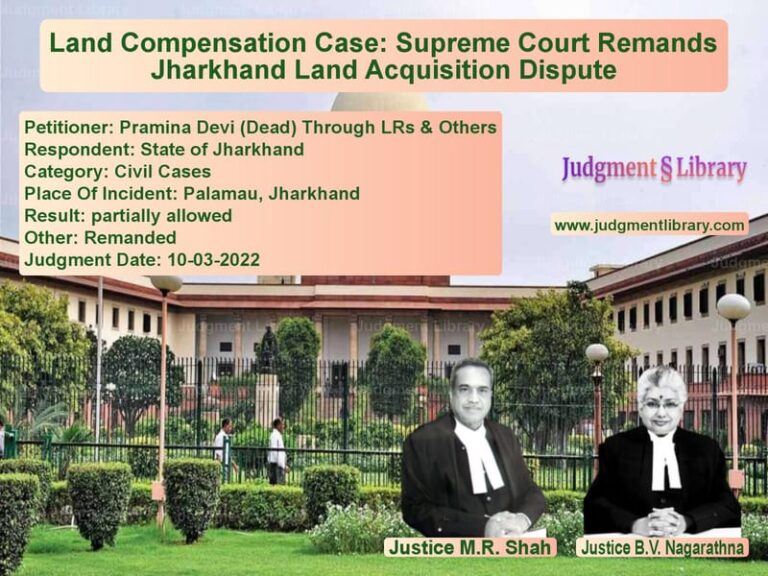Family Pension for Territorial Army Personnel: Supreme Court Grants Relief to Widow
The case of Santosh Devi vs. Union of India & Ors. is a landmark ruling regarding the entitlement of family pension for the widows of Territorial Army personnel who die while in a disembodied state. The Supreme Court of India addressed the issue of whether the widow of a deceased soldier, who had not completed the minimum service period for pension eligibility, should still receive financial relief.
Background of the Case
The appellant, Santosh Devi, was the wife of Raj Singh, a soldier in the 103 Infantry Battalion (Territorial Army). Raj Singh was enrolled in service on May 17, 1995, and served for 11 years and 289 days before being disembodied on March 31, 2008. On August 4, 2008, while in a disembodied state, Raj Singh died at home due to a heart attack.
The government denied family pension to the appellant, citing existing rules that required a minimum of 15 years of embodied service for eligibility. Despite repeated requests, the authorities refused to grant her pension. As a result, Santosh Devi filed a writ petition before the Armed Forces Tribunal, which upheld the government’s decision. She then appealed to the Supreme Court.
Key Legal Issues
- Whether Territorial Army personnel should be treated the same as regular Army personnel for pension purposes.
- Whether family pension should be granted to the widow of a Territorial Army soldier who died while in a disembodied state.
- Whether denying pension in such cases violates Article 14 (Right to Equality) of the Indian Constitution.
Arguments Presented
Appellant’s (Santosh Devi) Argument:
- Her husband had served in the Territorial Army for nearly 12 years and had a clean service record.
- The Pension Regulations for the Army, 1961, should apply equally to Territorial Army personnel.
- The government’s 1985 circular explicitly stated that family pension applies to the widows of Territorial Army personnel.
- Since Territorial Army personnel remain liable for service even in a disembodied state, they should be entitled to family pension.
- Denying family pension is discriminatory, as regular Army widows receive pension regardless of whether the soldier was in active duty.
Respondent’s (Union of India) Argument:
- Family pension is granted only to those who die while in an embodied state (active service).
- Raj Singh had not completed the required 15 years of embodied service.
- The Territorial Army is different from the regular Army, and pension rules should not be the same.
- The 2008 Pension Regulations explicitly state that Territorial Army personnel who die in a disembodied state are not eligible for family pension.
Supreme Court’s Analysis
The Supreme Court analyzed the case by considering previous regulations and policy documents. The Court found that:
- The 1985, 1998, and 2008 government circulars stated that family pension applies to Territorial Army personnel, but there was ambiguity regarding those who died in a disembodied state.
- The distinction between embodied and disembodied service was artificial, as Territorial Army personnel remain on call even when disembodied.
- The VI Pay Commission Report had already identified the unfairness in denying pension to families of disembodied Territorial Army personnel.
- Government authorities had previously acknowledged this issue but had taken no corrective action.
The Court emphasized that when regular Army personnel who die on leave or furlough are granted family pension, the same benefit should be extended to the Territorial Army.
Final Verdict
The Supreme Court ruled in favor of the appellant:
- The government was directed to pay an ex-gratia amount of Rs. 10 lakhs to Santosh Devi.
- The Court recognized the anomaly in the pension regulations and urged the government to rectify it.
- Future cases of Territorial Army personnel who die in a disembodied state should be reconsidered for pension eligibility.
Key Takeaways
- Territorial Army personnel should receive equal benefits: Their service is critical to national security, and their families should not be disadvantaged.
- Judicial intervention is necessary for pension reforms: The ruling sets a precedent for addressing anomalies in pension regulations.
- Government policy must be updated: The ruling highlights the need to reform pension policies to include disembodied Territorial Army personnel.
- Legal relief through ex-gratia compensation: Even when pension laws are unclear, courts can award compensation to ensure justice.
This ruling serves as a significant victory for the families of Territorial Army personnel, ensuring that their sacrifices are acknowledged and rewarded fairly.
Don’t miss out on the full details! Download the complete judgment in PDF format below and gain valuable insights instantly!
Download Judgment: Santosh Devi vs Union of India & Ors Supreme Court of India Judgment Dated 06-05-2016-1741860737738.pdf
Direct Downlaod Judgment: Direct downlaod this Judgment
See all petitions in Pension and Gratuity
See all petitions in Public Sector Employees
See all petitions in Employment Disputes
See all petitions in Judgment by T.S. Thakur
See all petitions in Judgment by R. Banumathi
See all petitions in partially allowed
See all petitions in Modified
See all petitions in supreme court of India judgments May 2016
See all petitions in 2016 judgments
See all posts in Service Matters Category
See all allowed petitions in Service Matters Category
See all Dismissed petitions in Service Matters Category
See all partially allowed petitions in Service Matters Category







